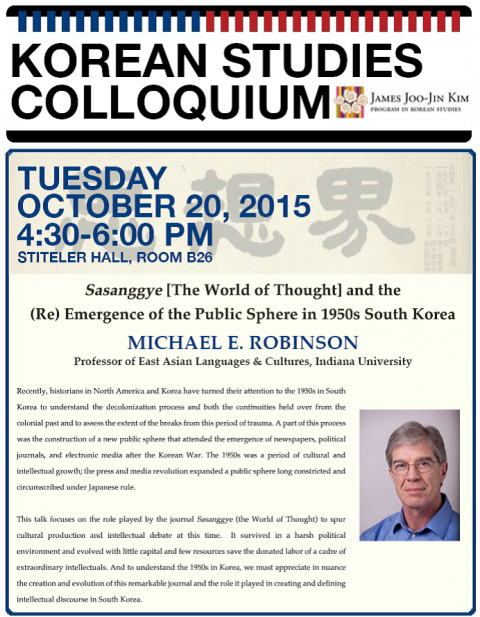
Korean Studies Colloquium
Stiteler Hall, Room B26
Michael E. Robinson, Professor of East Asian Languages & Cultures, Indiana University
Recently historians in North America and Korea have turned their attention to the 1950s in South Korea to understand the decolonization process and both the continuities held over from the colonial past and to assess the extent of the breaks from this period of trauma. A part of this process was the construction of a new public sphere that attended the emergence of newspapers, political journals, and electronic media after the Korean War. It was within the new public sphere that the intellectual process of de-colonization could finally begin. The 1950s was a period of cultural and intellectual growth; the press and media revolution expanded a public sphere long constricted and circumscribed under Japanese rule. While the ROK created a new censorship regime based on a fierce anti-communism, it did not slow significantly the rapid emergence of new intelligentsia and greatly expanded intellectual discourse.
This talk focuses on the role played by the journal Sasanggye (the World of Thought) [hereafter, SSG] to spur cultural production and intellectual debate at this time. It survived in a harsh political environment and evolved with little capital and few resources save the donated labor of a cadre of extraordinary intellectuals. By the political transition of the early 1960s, SSG became a base for political activism of intellectuals and students, fostered debates surrounding the creation of the Second Republic, and provided economic expertise for the government and planning policies of Park Chung Hee—all the while championing liberal democratic values. Understanding SSG’s rise, maturation, and ultimate decline shows that ideas did matter. And to understand the 1950s in Korea, we must appreciate in nuance the creation and evolution of this remarkable journal and the role it played in creating and defining intellectual discourse in South Korea.
 James Joo-Jin Kim Center for Korean Studies
James Joo-Jin Kim Center for Korean Studies